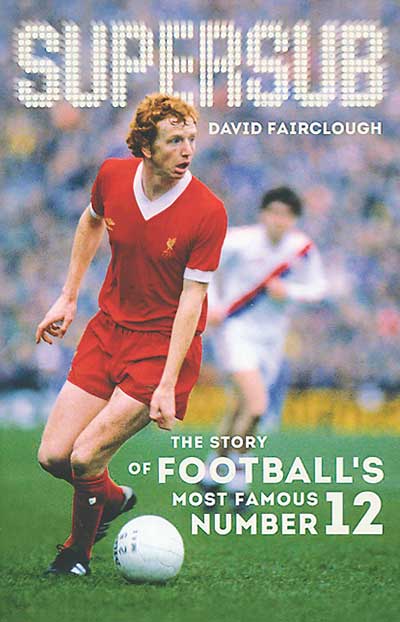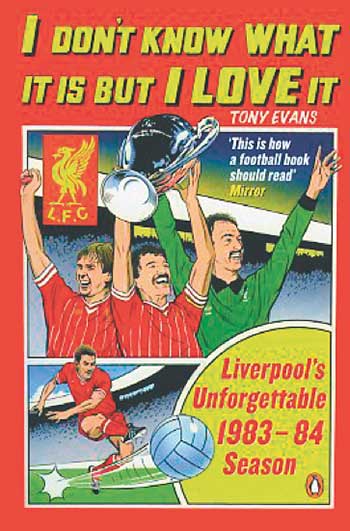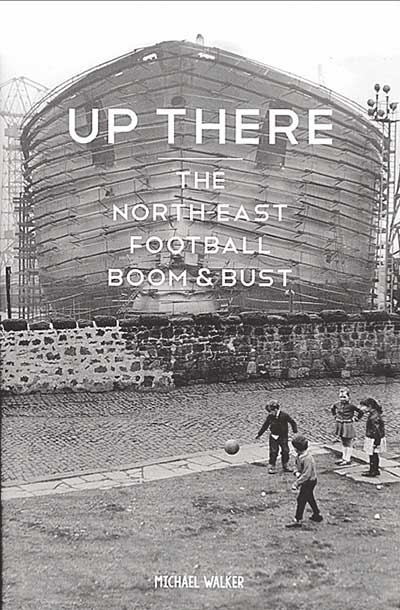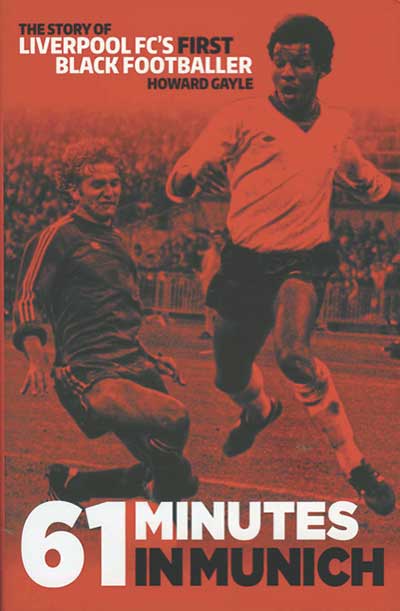Search: 'Bob Paisley'
Stories
 The story of football’s most famous number 12
The story of football’s most famous number 12
by David Fairclough and Mark Platt
De Coubertin Books, £18.99
Reviewed by Dan Davies
From WSC 345 November 2015
Between making his first team debut in November 1975 and playing his last game for the club in April 1982, David Fairclough made just 92 starts for Liverpool. He was named as substitute, more often than not the only substitute, in a further 137 matches and came off the bench in 62 of them – a club record he currently has the dubious distinction of sharing with Danny Murphy, Vladimir Smicer and Ryan Babel.
If this does not sound like particularly fertile territory for an autobiography, it should be pointed out that 18 of the forward’s 55 goals for the most successful club in Europe at the time were scored as a substitute, the most famous being the winner against Saint-Étienne in the second leg of a European Cup quarter-final at Anfield in 1977, the year Liverpool went on to lift the trophy for the first time.
This happy knack earned the local boy a nickname he came to detest and which defined his career. It is Fairclough’s honest appraisal of the 72 occasions he was an unused substitute, however, which provide the book’s most telling insights. “Even getting a shower brought with it a sense of guilt,” he writes, before admitting that as the years went by and a regular starting spot continued to elude him, he began to think only of himself: “To me, every game Liverpool won, or even played, without me was a slight on my ability and setback for my career.” He maintains that “everyone was out for themselves”, with first team regulars routinely concealing injuries because they feared if they dropped out of the team they might never be able to get back in again.
From the first chapter, it is clear who Fairclough blames for the “sense of resentment” he now feels at the way his career panned out. Bob Paisley is variously described as “cowardly” and “pathetic”, despite Fairclough winning four League titles, two European Cups (one as an unused sub), a UEFA Cup and League Cup under Anfield’s most successful ever manager.
The most vehement criticism for Paisley is reserved for way he broke the news to Fairclough that he would not be figuring in the 1977 FA Cup final, a decision that upset the boyhood Liverpool supporter so much he admits there were times in the game he wasn’t sure he wanted his team to win. The disappointment was compounded by Paisley’s “false promise” that he was being saved for the European Cup final in Rome a few days later. “I wouldn’t go as far as to say that it moulded me as a person,” Fairclough reflects, “but it certainly instilled a sense of cynicism in me.”
Whether Paisley was right to harbour doubts about Fairclough, who made more appearances for Liverpool’s reserves than he did for the first team, is a moot point. The second half of the book, in which his career peters out in a series of short-lived spells in America, Switzerland, Belgium and the lower reaches of the Football League, is characterised by further criticisms of managers who failed to pick him regularly.
The final stop was Wigan Athletic, where he fell out with manager Bryan Hamilton. “You’ve never fulfilled your potential,” said Hamilton as Fairclough walked out of his office. It’s a verdict, Fairclough readily admits, that has haunted him ever since.
 Liverpool’s unforgettable 1983-84 season
Liverpool’s unforgettable 1983-84 season
by Tony Evans
Penguin, £9.99
Reviewed by Jonathan Paxton
From WSC 343 September 2015
On paper Liverpool’s 1984 treble winners were a surprisingly ordinary side. Even with Graeme Souness, Ian Rush and an occasionally fit Kenny Dalglish, this was a team in transition under new manager Joe Fagan, one that could lose 4-0 at Coventry and in which Michael Robinson could hold down a regular place. Tony Evans, a Liverpool fan who attended nearly all the games that season, holds them in higher regard than the statistically superior and more skilful sides of either 1979 or 1988 and his adoration shines through, if sometimes a little too brightly.
An experienced journalist, at the Times until recently, Evans writes from the perspective of an ardent fan of both club and city. The book’s title (an obscure Chris Rea track, apparently popular only in the Anfield dressing room) and the cover artwork suggest a nostalgic, feel good story but despite the team’s success, attendances are low and the city is struggling economically. Some interesting social and political asides featuring Derek Hatton and Margaret Thatcher are touched upon but the book’s focus never strays far from football.
Through interviews with team members, we find a mainly happy squad but a social group with a heavy drinking culture that new signings and reserve players find daunting. The much eulogised bootroom is presented as dingy with paint flaking off the walls and around the training ground there is an atmosphere of intimidation that sometimes approaches bullying. New boy Craig Johnston is ridiculed for his diet and fitness regime and, in one of the book’s most interesting sections, his failure to hold down a first-team place pushes him close to a breakdown. Meanwhile, Alan Kennedy’s happy-go-lucky attitude seems to be what cements his position in the side and Fagan struggles to shape a midfield to cover the clumsy defender without ever considering a replacement left-back.
Fagan himself remains an elusive enigma, mainly because the manager was so private and reluctant to speak to the media. His is clearly respected by his players and a good motivator, yet we don’t get the impression he had the wit or tactical insight to compare with his predecessors Bill Shankly and Bob Paisley. Even through quotes from his diary we struggle to get to know Fagan the man. Entries such as “Well the lads did it, each one deserved a medal” suggest that he was dull and unimaginative.
Evans does tell a good story and undoubtedly loves his subject. Sometimes though rambling quotes from players can be overlong and struggle to explain a point clearly, and when the squad travel to Denmark the journalist in Evans can’t resist a Hans Christian Andersen/fairytale analogy. At points it reads like a hagiography of the team, particularly Souness who kicks and punches his way through matches but is lifted to the status of demi-god by the author. Like Souness, this book may not be universally popular outside of Anfield but it stands as an interesting if rose-tinted review of what was a very successful team.
 The north-east, football, boom & bust
The north-east, football, boom & bust
by Michael Walker
DeCoubertin Books, £16.99
Reviewed by Paul Brown
From WSC 334 December 2014
In 1960 the BBC journalist Arthur Appleton wrote a still-admired portrait of north-east football called Hotbed of Soccer. The title was apt, the book being published between Jackie Milburn’s Newcastle winning the FA Cup three times in the 1950s, and Bobby and Jack Charlton’s England winning the World Cup in 1966. The north-east had long been regarded as football’s great nursery, producing a succession of fine players and influential managers.
Yet Appleton recognised that the area’s influence on British football was waning. Its clubs were in decline and its players were leaving the region. As cases in point, Newcastle have not won a domestic trophy since the 1950s, and neither Charlton brother played for a north-east team. Even from his 1960 vantage point, Appleton was inclined to look back. “When the present has been temporarily exhausted, there is the rich past to be peeped into,” he wrote.
Fifty-four years later, Michael Walker explores that rich past, and the unavoidably depressed present, in Up There, an excellent and long-overdue social history of north-east football. From the game’s earliest years, Walker shows how the industrial north-east established itself as a football powerhouse. Cash-rich Sunderland won the Football League four times by 1902 and innovative Newcastle won the League three times, and the FA Cup, by 1910. There was a seemingly infinite stream of great players, from Colin Veitch, Raich Carter and Wilf Mannion to Stan Mortensen, George Camsell and Stan Anderson (who, uniquely, captained Newcastle, Sunderland and Middlesbrough).
Some became great managers. Brian Clough and Don Revie both grew up in terraced houses in Middlesbrough. Bob Paisley and Bobby Robson, like many of the region’s most prominent football characters, came from mining communities. As Walker discovers via a series of insightful interviews, mining and other industries were central to the success of north-east football, providing structure and stability for community teams and local players. When north-east industry took hits, so did north-east football, particularly after the wars, and then, fatally, during the brutal 1980s.
The 1990 World Cup represented something of a last hurrah. England’s starting XI included four north-east players in captain Bryan Robson, Paul Gascoigne, Peter Beardsley and Chris Waddle, plus manager Bobby Robson. By the 2014 World Cup, England’s sole north-east-born starter was Jordan Henderson. Henderson is one of the few remaining north-east players in the Premier League, with Steve Bruce the only north-east manager.
The decline of north-east football at all levels is well illustrated when Walker presents Durham FA secretary John Topping with a 1983-84 yearbook, and asks what has happened to its list of 16 youth leagues. “Gone. Gone. Gone…” replies Topping. Only two of the 16, he explains, are still around.
Walker does manage to find some causes for optimism. The pioneering Northern League is celebrating its 125th anniversary this year, Gateshead are pushing for a return to the Football League and Middlesbrough are challenging for promotion to the Premier League. At junior level, Northumberland’s Pinpoint League is thriving, catering for 12,500 young players. “It’s a mini-revival,” the Pinpoint League’s Ian Coates tells Walker. “In five years’ time I think what you’ll see are more local boys and better local boys playing for the big north-east clubs.”
